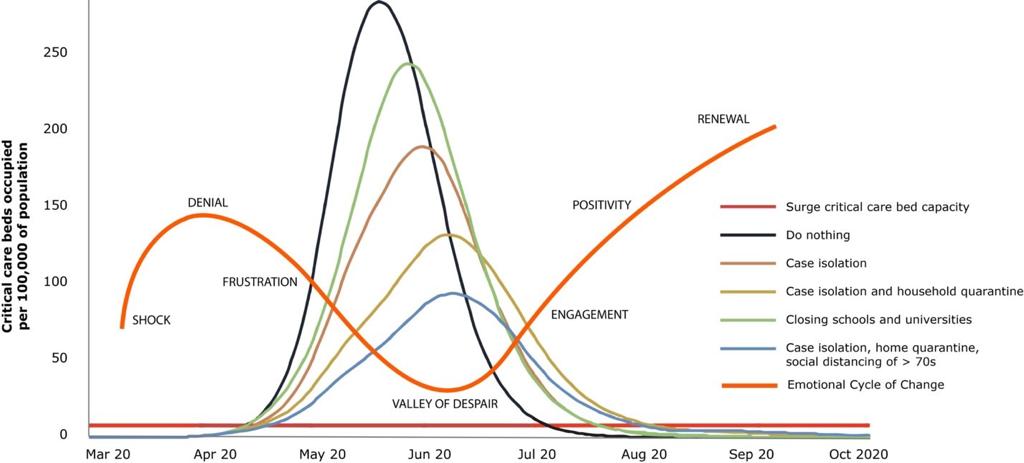When change is forced upon us, it can come as somewhat of a shock. We all know the emotional cycle of grief – shock, denial, frustration, depression, acceptance – but may not be so attuned to how this same emotional cycle applies to other types of change.
At the present moment that change is the impact of COVID-19. There is no doubt that as individuals and businesses we face a period of significant change. We cannot always control the changes that are happening around us, but we can control how we react and plan in response to them.
Knowledge is power
Enter the Change Curve. This model helps us to understand the emotions we may go through when faced with change or challenges in the workplace or in our personal lives. The Change Curve is based on Elisabeth Kubler-Ross’ original model from the 1960s. It is widely used to help people understand their response to significant change or upheaval. Understanding what’s happening is the first step towards planning and moving towards a resolution.
At Citywide we have been thinking long and hard about this and actively reaching towards understanding. We are putting a plan in place for our clients and our business, so we can help and support each other through the upcoming changes. The graph below is based on modelling from Imperial College. It shows the cycle of emotions that we may go though over the coming months as the virus’ effects unfold, overlaid with possible interventions.
Ferguson, N., 2020. Impact Of Non-Pharmaceutical Interventions (Npis) To Reduce COVID-19 Mortality And Healthcare Demand.
Citywide are taking practical steps towards moving through the emotional cycle at pace. By engaging early, we will avoid spending too much time in the unproductive phases of shock, denial, frustration and despair. Instead, let’s skip right to the stages of engaging with our new normal and adapting accordingly. Knowledge is a key building block in reacting to change with a calm, informed, planned approach. As such, over this period we’re bringing you the robust, research-informed insights that you need to get the best outcomes during this difficult time.
One of the most important things to remember is that investing is for the long-term and it’s vital to remember some key points right now.
- Patient and long-term investors always win out
- Market timing is not sustainable and those claiming they can do it are wrong (and often lucky only in the short term)
- All the evidence points towards a ‘buy and hold’ strategy
- When the last big temporary decline happened around the time of the financial crisis, those investors who did nothing had the best results
- These types of temporary declines are common – the important word here is ‘temporary’
Remember these five key points any time you feel yourself slipping along the Change Curve. Don’t be tempted to listen to the newspapers’ fearmongering. Stick with it.
Coming up the curve
It’s well-known and proven that a constant cycle of bad news is bad for our mood and mental health. Research has shown that negative TV news contributes significantly to feelings of sadness and anxiety, and social media can be even worse. Endlessly scrolling Facebook and Twitter and exposing yourself to news piece after news piece won’t do you any good.
With that in mind, let’s end with some good news from around the world. Remember, this time will pass.
SOME GOOD NEWS
China has closed all 16 temporary coronavirus hospitals in Wuhan as they don’t have enough new cases to support them.
New York Post
U.S. researchers delivered the first COVID-19 vaccine to volunteers in an experimental test program.
ABC News
Air pollution has plummeted in cities with high rates of quarantine.
earthobservatory.nasa.gov
Doctors in India have successfully treated an Italian COVID-19 patient. The combination of drugs used include Lopinavir, Ritonavir, Oseltamivir and Chloroquine.
The Telegraph
“A team of 10 scientific researchers from the Erasmus Medical Center in Rotterdam and Utrecht University say they are the first in the world to discover an antibody capable of fending off an infection by COVID-19. The discovery could lead to an antiviral medication.”
NL Times, Erasmus Magazine
A 103-year-old Chinese grandmother has made a full recovery from COVID-19 after being treated for six days in Wuhan, China.
Independent
Apple has reopened all 42 of its retail stores in China.
Business Insider
Finally, we would urge you to give something back to your community and pull together in this time of need. Our team have been looking after the most vulnerable people around us this week. Thus far we have taken meals to clients that are stuck at home with partners who are unwell, bought vegetables for elderly clients who can’t get to the shops, and helped source sold-out items for those who need them.
Now is the time to stand together, not apart. Keep the Change Curve in mind; remember the key points; and take care of those around you.
